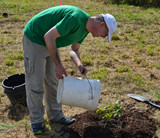
| Home | Source Reduction | Friends of Green Friends | Newsletters |
| Gardening | Resources | What You Can Do | Embracing The Trees |
Green Friends "LIVING CONSCIOUSLY" Ten Step Guide |
|
| We are all intricately connected with and dependent on the ecosystems of this planet. We must remember that our relationship with Nature should not only be to take. It is a symbiotic relationship. We must give and replenish as much as we receive. We must live and consume consciously. Here are ten ways we can begin to live like responsible planetary citizens.
1. Develop reverence for Nature 3. Develop reverence for plants 4. Develop reverence for wildlife 10. Inspire others * Ravis's Tips for Conserving Water and Energy
|
 |
By Reducing the waste we create, Reusing items several times instead of discarding them and Recycling raw materials we reduce our energy consumption and use of fossil fuels, save water, and reduce greenhouse gas emissions. With the worlds population growing at a rapid rate we cannot afford to be producing as much waste as we do. Our waste can become a resource. Composting is one simple example. By recycling food scraps we reduce landfill waste and can produce a rich organic matter to add to our soils.
We need to consider that the earth is for everyone (and all living beings) and to be shared with everyone. If one population or species consumes more than its share, others will suffer. We can find ways to feed the world if we focus on the global community, and in our daily lives take only what we really need. |
 |
Never underestimate the power of being a consumer. By choosing to purchase certified organic and environmentally friendly products you can directly help prevent the depletion of natural resources, and the pollution and disruption of important ecological systems. Purchasing certified organic or biodynamic products supports diversity in fruit and vegetable varieties and the preservation of heirloom seed. In addition, you will be consuming food that is potentially higher in nutrients and free of toxic chemicals.
As a consumer we can support companies that operate under fair-trade laws—thus helping to prevent third world exploitation, support sustainable agriculture, renewable energy and ethical investment. We are creating the future with every choice we make. Each of our actions will have an impact on the future of the planet. |
| Home | Source Reduction | Friends of Green Friends | Newsletters | Resources | What You Can Do | Contact Us |
For more information, e-mail info@greenfriendsna.org |
||||||







